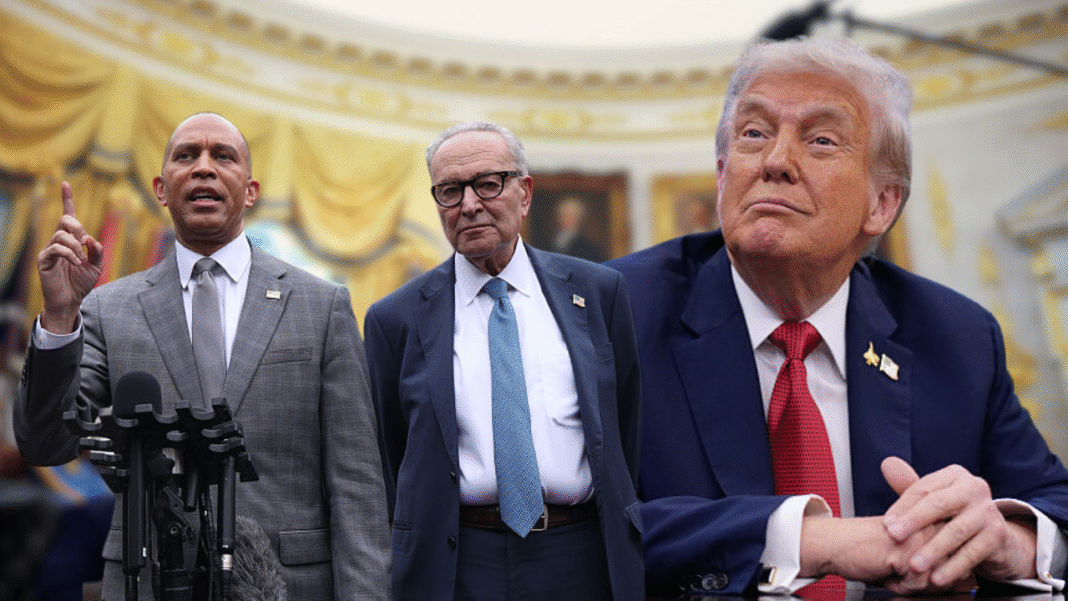Political Tensions and Rhetoric: A Look at Trump, Jeffries, and Schumer
In the heart of Washington, a tense and pivotal meeting unfolded between President Donald Trump, House Minority Leader Hakeem Jeffries, and Senate Minority Leader Chuck Schumer. This high-stakes discussion was centered around pressing issues, primarily the looming threat of a government shutdown and the critical need to address health care funding.
The Oval Office Meeting
On a recent Monday, Trump welcomed Jeffries and Schumer to the Oval Office with the intent to find common ground on health care subsidies that were significantly cut by Republicans. The Democrats walked into the meeting with a clear message: the restoration of health care funding is vital for millions of Americans, particularly in light of impending premium increases under the Affordable Care Act (ACA).
However, the dialogue did not yield the results they had hoped for. Instead, Trump emerged from the meeting with a charged rhetoric, labeling the Democratic leaders as “deranged,” while accusing them of plotting to “destroy healthcare in America” by supposedly extending benefits to undocumented immigrants.
The Controversial AI Video
The situation escalated when Trump took to social media to post an inflammatory AI-generated video that mocked Jeffries and Schumer. The video depicted real footage of the leaders speaking to reporters but altered with derogatory voiceovers and tacky imagery, including cultural stereotypes. Jeffries appeared wearing a sombrero and a fake mustache, symbolizing Mexican culture—a depiction that many critics condemned as both racist and derogatory.
In the fabricated dialogue, a voice impersonating Schumer lamented about lost support among African Americans and Latinos, suggesting that offering free health care to undocumented immigrants could coax those groups into voting for Democrats. This narrative not only misrepresented the situation but also used racial stereotypes in a way that many found deeply offensive.
Backlash from Democratic Leaders
The reaction from Jeffries and Schumer was swift and pointed. Jeffries took to social media to denounce Trump’s actions, stating, “Bigotry will get you nowhere. Cancel the Cuts. Lower the Cost. Save Healthcare. We are NOT backing down.” His statement underscored the seriousness of the situation—he wasn’t just defending himself; he was standing up for the millions affected by potential health care cuts.
Schumer echoed Jeffries’ sentiments, criticizing the president’s inability to negotiate and labeling his actions as tantamount to throwing tantrums instead of engaging in constructive dialogue. This stark exchange showcases the deep divisions that have emerged in American politics, especially around issues that deeply affect everyday citizens.
The Health Care Funding Debate
At the core of this conflict lies the Democrats’ insistence on extending ACA subsidies, which were crucial during the COVID-19 pandemic. They argue that without these subsidies, millions of Americans will face skyrocketing health care premiums, making it increasingly difficult for families to access necessary medical care.
Democrats are not only advocating for the ACA but are also pressing for the restoration of significant Medicaid funding that was slashed under Trump’s “One, Big, Beautiful Bill.” The Republican stance has consistently framed these demands as financial support for undocumented immigrants, a claim that lacks basis in federal law, which prohibits non-citizens from accessing public health care resources.
The Wider Implications
If this impasse continues without resolution, the implications could be dire, especially for marginalized communities. Historically, Black Americans rely heavily on public health care funding, and cuts to Medicaid could leave many without coverage or facing exorbitant costs. As the deadline for resolving these issues looms closer—set for 12:01 a.m. Wednesday—the stakes are incredibly high.
The political wrangling around health care is not just a legislative issue; it is a matter of life and death for many. The contrasting messages from Trump and Democratic leaders reflect broader societal tensions, where health care often becomes a battleground for deeper ideological divides.
In this heated political climate, it remains to be seen how both sides will navigate the contentious landscape ahead. As calls for health care reform grow louder, so too does the urgency for leaders to step away from hateful rhetoric and work towards a sustainable solution for all Americans.



